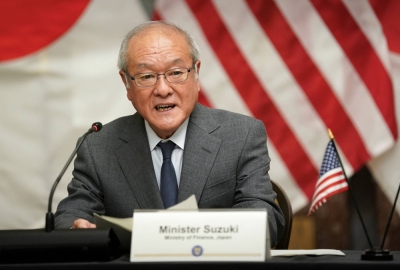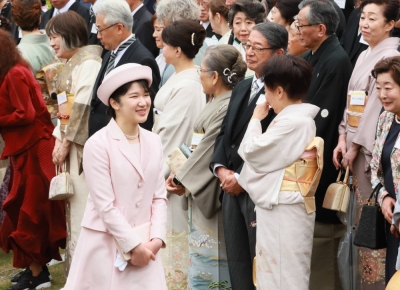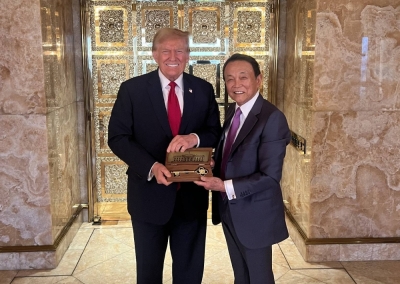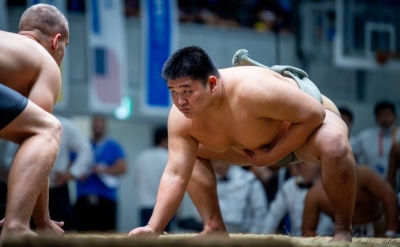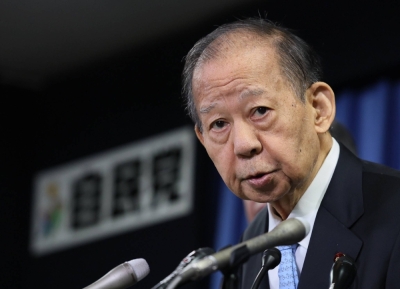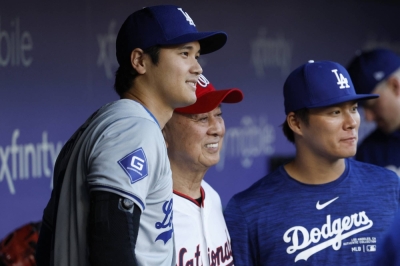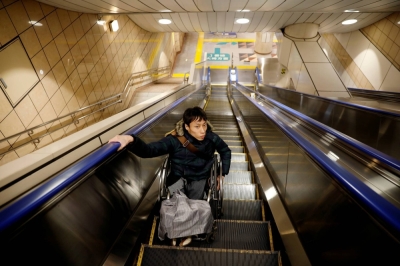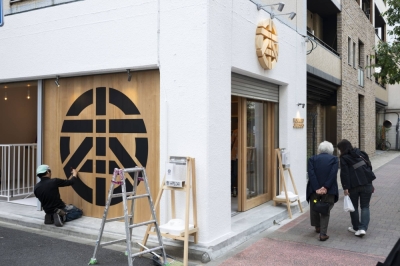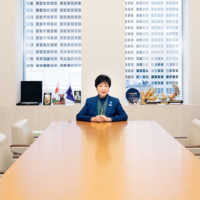FOUNDING PRINCIPLES UNCHANGED
Rising to the challenges ahead
By YUKIKO OGASAWARA
President, The Japan Times
Dear readers,
 It is with reverence and awe, that on this day, we find ourselves entering into 110 years of uninterrupted publication. I cannot help but wonder if our founders, who created this channel of communication during tumultuous times, could have imagined such longevity and success. How thrilled they would be to know we are still here today and to see their founding principles still intact.
It is with reverence and awe, that on this day, we find ourselves entering into 110 years of uninterrupted publication. I cannot help but wonder if our founders, who created this channel of communication during tumultuous times, could have imagined such longevity and success. How thrilled they would be to know we are still here today and to see their founding principles still intact.
Although I am the new kid on the block, I am also very conscious of both the honor and the weight of this legacy on my shoulders. I hope to ensure that this company has an equally prosperous future, and I am greatly looking forward to tackling any challenges that might lie ahead.
As we all know, these are particularly challenging and yet exciting times for the newspaper business. Worldwide, the media landscape is shifting right before our eyes like some kind of living organism.
Information sharing is becoming ever-more democratic as traditional distribution channels are being circumvented. Now everyone -- and his or her alter-ego -- can be a publisher, and just when we think we are seeing the new lay of the land, something else comes along and changes all the rules.
The 20th century has been called the Age of Extremes because we witnessed some of the most dramatic and rapid sociopolitical shifts of all time. How will the 21st be seen by future historians? How will we evolve?
I personally believe that we have much to look forward to. Over the past decade, we have been hearing more and more voices from all over the world, as media consumers no longer have to be beholden to a select few. In fact, media consumers now have easy assess to the tools of the creators. Thanks to developments such as blogs, social networking and user-contributed online content, Andy Warhol's prediction of 15 minutes of fame has become manifest, be it on reality TV, YouTube or Mixi. It's a terribly exciting time, indeed.
History shows us that when we receive news tools, we forge new destinies. This was certainly the case when we moved from a hunter-gatherer society to an agrarian one. The technology of farming and cultivation drastically shifted our choices and created new means of labor and leisure, and -- for better or for worse -- set the course for modern civilization. Likewise, the advent of Johannes Gutenberg's movable type in the 1400s opened a door to mass communication and helped fuel the cultural explosion of the Renaissance.
Technology foreshadows social change, and today, I believe we are setting our sails to catch another colossal wind of change. But to see the future for The Japan Times we must also assess our raison d'e^tre. Before we speed ahead, we must first stop and ask ourselves: Who are we and what relevance do we hold?
Though our civilization may appear accelerated and advanced, we still have much the same human needs and emotions as our ancestors. The ways in which we satisfy those needs might change over time, but those essential desires are more or less a constant. Will we always want news? Will we always have a need to share and communicate? To argue and to be heard? Will we always be curious and seeking new information and insight?
Yes, the answer is yes. There will always be a demand for the type of content that The Japan Times provides. In fact, interest in Japan is growing once again at a formidable rate. Thanks to the exportation of everything from hybrid cars and robotic technology to anime , manga and baseball aces, Japan's star is ascending.
Having said that, I know that people are having to become multitaskers to keep up with the daily flood of information. Using our greatest asset, our expertise at distilling the essence of the zeitgeist, The Japan Times will strive to deliver the smartest, most interesting content and news to our readers in real time, and do it efficiently, in a lucid to-the-point style that engenders debate and discussion and satisfies your concerns and curiosity. As Reuters CEO Tom Glocer so rightly observed last year, media needs to serve as a "filter of content." We will continue to sift through the flotsam and jetsam to deliver to you what is essential, what matters.
And in keeping with our original mission, our main focus is still on the sharing of information between the East to the West and vice versa. What has changed since the time of founders are the means of conveyance. What will be the conduit of this communication? How will we continue to satisfy the hunger for information in multiple formats? The modes of delivery are multiplying and changing. Will our content be served on small cell-phone screens, in podcasts or on digital e-paper? Or will we, looking further into the future, plug ourselves into direct neural data feeds?
It is my belief that as a responsible and responsive media company we must keep ourselves limber and our minds open, to be able to not only adapt to trends and technologies but also to choose the ones that serve our readers best. I think it is absolutely critical to begin to change the things that we know we can, and to keep building that flexibility and momentum toward critical mass.
In the coming year, you will see changes in the way we define ourself as a media company. You'll see a new focus on freshness and information about Japan and for readers in Japan. With both insight and foresight, looking out while looking in, we will deliver all news, features and analysis in a manner that only a true independent paper such as The Japan Times can do.
Most importantly, as we evolve, we will be listening closely to the opinions of our current readers while reaching out to new readers. The huge response to our readership survey was extremely encouraging and enlightening. We received both confirmation of our hard work as well as suggestions on how we can do our job better.
I am currently leading this company with these priorities in mind and making decisions one by one toward adaptability and sustainability best suited to the current market economy and the changing media landscape. Not all decisions are easy, and not all ideas come like a lightning bolt. Changing the course for a traditional media company must happen at a steady keel, but I feel that the time is ripe for change.
Appropriately, it is said that the year of the golden pig is an optimal year for giving birth, and that is exactly what we will do: give new life.
I want to express my deepest gratitude to all of our supporters and to all those that continue to look to us for the best news, features and analysis on Japan.
Committed to our mission
By TOSHIAKI OGASAWARA
Chairman and Publisher, The Japan Times
 On March 22, 1897, the first edition of The Japan Times was printed and today it proudly reaches the 110th anniversary of its founding. As chairman and publisher of the newspaper, I would like to express my thanks to you, our readers, who have generously and steadfastly supported the paper through the vicissitudes of its existence.
On March 22, 1897, the first edition of The Japan Times was printed and today it proudly reaches the 110th anniversary of its founding. As chairman and publisher of the newspaper, I would like to express my thanks to you, our readers, who have generously and steadfastly supported the paper through the vicissitudes of its existence.
The first edition carried an editorial that described the mission of the newspaper: first, to develop better understanding between Japanese people and foreign residents; and, second, to report and explain Japan's external policy and behavior to the Western powers. These roles remain largely unchanged in this present day although the economic and political focus is gradually moving eastward with the emergence of China and India on the world stage.
While the newspaper's mission remains the same, the means by which it can accomplish it are changing rapidly. Not only The Japan Times, all newspapers face a severe challenge in adapting successfully to the age of the Internet through which news and information can be disseminated worldwide at the press of a button.
I think that it is true to say that the pace of technological change is faster now that at any other period of existence of the newspaper. As a result, the demands on the newspaper to change and adapt are more burdensome than ever before. Yet, I remain confident that our newspaper will successfully overcome this challenge as it has many others in its 110 years.
The Japan Times remains a window to the world and continues to play an invaluable role in providing news in the English language from an independent Japanese perspective that other media are loath to do. However, we must not forget the needs of those foreign residents of Japan who want information to help with their daily lives in this country. It is important that foreign residents are able to enjoy a full and satisfying life in this county and also take a more active role in community affairs.
Our newspaper remains committed to its mission and we ask for our readers' continued support, guidance, and encouragement throughout the years to come.



